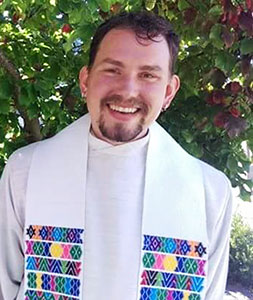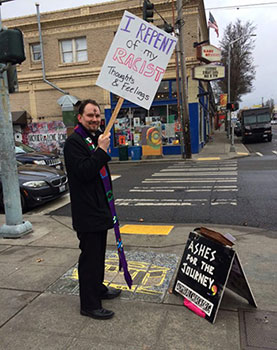| Search PNC News for stories of people and churches in our UCC Conference: |
|---|
Admiral presents ‘Whiteness and Idolatry’ class, and invites RA
Andrew Conley-Holcom, pastor of Admiral Congregational UCC in Seattle, is promoting two ways to overcome white supremacy and racism.
 |
Andrew Conley-Holcom offers two ways to address racism. |
This summer Admiral UCC launched a six-week study series of modern prophets on white racial identity, looking at “whiteness” through the lens of biblical idolatry.
For six weeks from late June to early August, he taught a course on “The Idolatry of Whiteness,” exploring the intersections of the Hebrew prophets’ calls to reject idolatry and modern prophets’ calls to dismantle whiteness and white supremacy.
Seventeen participated, including two community members. Because of their positive response, he is offering the six-part study series he developed again from 1 to 2:30 p.m., Sundays, Oct. 13 to Nov. 17, at Admiral UCC, 4320 SW Hill St.
“Using the Golden Calf of Exodus 32 as the exemplar of idolatry, we examined how whiteness uses similar techniques to move people toward false beliefs about themselves and others that 1) minimize personal responsibility, 2) gather resources for group benefit, 3) re-write history to justify white status, 4) pervert or hijack worship of God, and 5) numb the suffering that whiteness inflicts on its adherents as well as its victims,” said Andrew, who developed the series.
“I’m not racist” is the quintessential idolatrous statement in this course, because it hides the historical and present reality, Andrew said.
“We live in a racist society, so how could we possibly be free of racism?” he asked.
He introduces about 50 pages from each of 10 books for people to read, such as Raising White Kids (Harvey), Stamped from the Beginning (Kandi) and White Fragility (DiAngelo). His idea is that no one book is a complete picture, and he hopes to invite people to read more.
The first session establishes the group and introduces idolatry. The other sessions look at idolatry and materiality/wealth, history and memories, transcendence and objectivity, exile, justice and seeing anew, and liberation and renewal through the power of repentance and the need for relationship.
“Our goal is to start a conversation that needs to continue. I hope to open doors. The course is a 30,000-foot view of the creation of the white racial identity.
“What is white identity? What does white mean? Whiteness is not equivalent to the concept of black, Latino or Asian, because ‘white’ is a political category unique to the U.S., not a race or ethnic identity,” he said.
Andrew shares historical information to contextualize the purpose of whiteness.
“The concept of white racial identity was created to determine who was deserving of having rights and who was not. The Naturalization Act of 1790, for example, said that only white men of good moral character were welcome to be citizens of the U.S. Other laws codified white as a political category. The 3/5 rule discussed beginning in 1783 was adopted by the 1787 Constitutional Convention that the census for representation would tally slaves as 3/5 of a person so the South would have better representation.
“We unravel the mythology that America was begun as a place with freedom for all. White racial identity was central to be an American. So there is reason for anxiety among the white male conservative patriot movement, because historically the U.S. was a white male, patriarchal society. That’s why some are threatened by inclusion of women and people of other races and ethnicities,” Andrew said.
“Enfranchising others, women’s rights, civil rights and immigrants’ rights mean white males may lose property, privileges and power,” he said.
The class also looks at how the category of white changed over time. At first, Italians and Irish were not considered white. They negotiated to be accepted as white by capitulating to racism against black and brown people, he said. They had to give up their national ancestries and identities to be white.
“It was harmful to all, because many forgot or rewrote their immigration stories. Many do not know about the generation before their grandparents other than that they were Irish or Dutch.
“What does liberation look like?" Andrew asked. “It’s an alternative. It’s to be anti-racist. How is being anti-racist different from being not racist? It involves repenting from internalized racial superiority, being willing to identify and address the prejudices we hold. Once we are willing to humble ourselves off the altar of being ‘not racist,’ then we can do the real work of addressing racist systems in our society.”
Andrew seeks other PNCUCC churches who are ready “to try something risky and join in an Anti-Racist Lent,” using Racist Anonymous (RA) resources offered by the Rev. Ron Buford, who has been offering RA for three years in his church in Sunnyvale, Calif.
 |
Andrew Conley-Holcom offers ashes on Ash Wednesday last year. |
“While we may talk about white supremacy and equity in our mostly-white churches, often we do so at the 30,000-foot level. Rarely are we confessional or repentant in a way that is both courageous and healing,” said Andrew.
Racists Anonymous uses the familiar 12-step recovery model. It gives participants the opportunity to let go of their ego-attachments to being “not racist” so they can unearth, address and recover from internalized racial biases.
“We live in a prejudiced society and can never be totally free of racism, but we can address our racial superiority and work to be anti-racist,” he said.
“A segregationist believes individuals are created in an inherent hierarchy of inferiority to superiority, so races should be separate. Assimilationists believe the reason for inequality is cultural and behavioral differences that can be changed.
Anti-racism recognizes systems and structures in place are designed to disenfranchise people from access to resources and power. It sees all people as one, and inequality is created in history.
Andrew seeks to organize a coordinated launch of RA groups in the PNC during Lent.
“If the groups find traction, maybe we could start a revolution. At least we can give up the notion of being ‘not racist’ for Lent in 2020,” he said.
Registration for the six study idolatry series is limited to 20 and the fee is $20. For information, call 206-932-2928 or email officemgr@admiralchurch.org or email pastorandrew@admiralchurch.org.
Pacific NW United Church News copyright © Fall 2019
